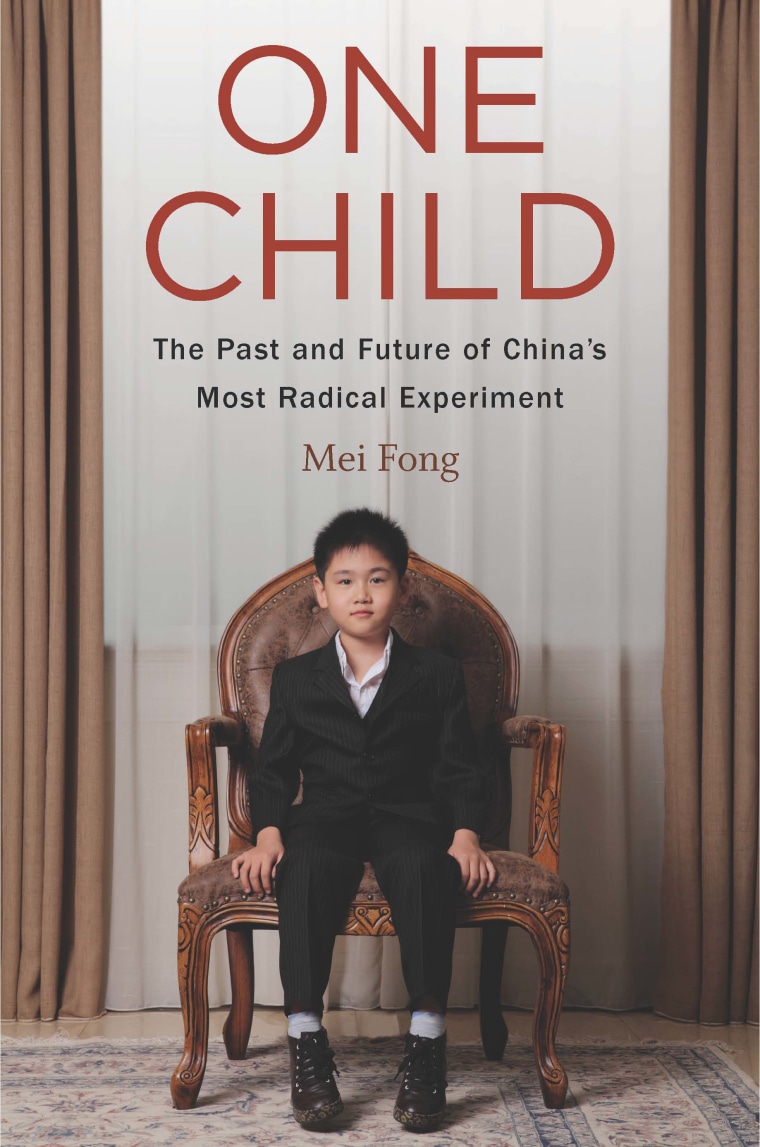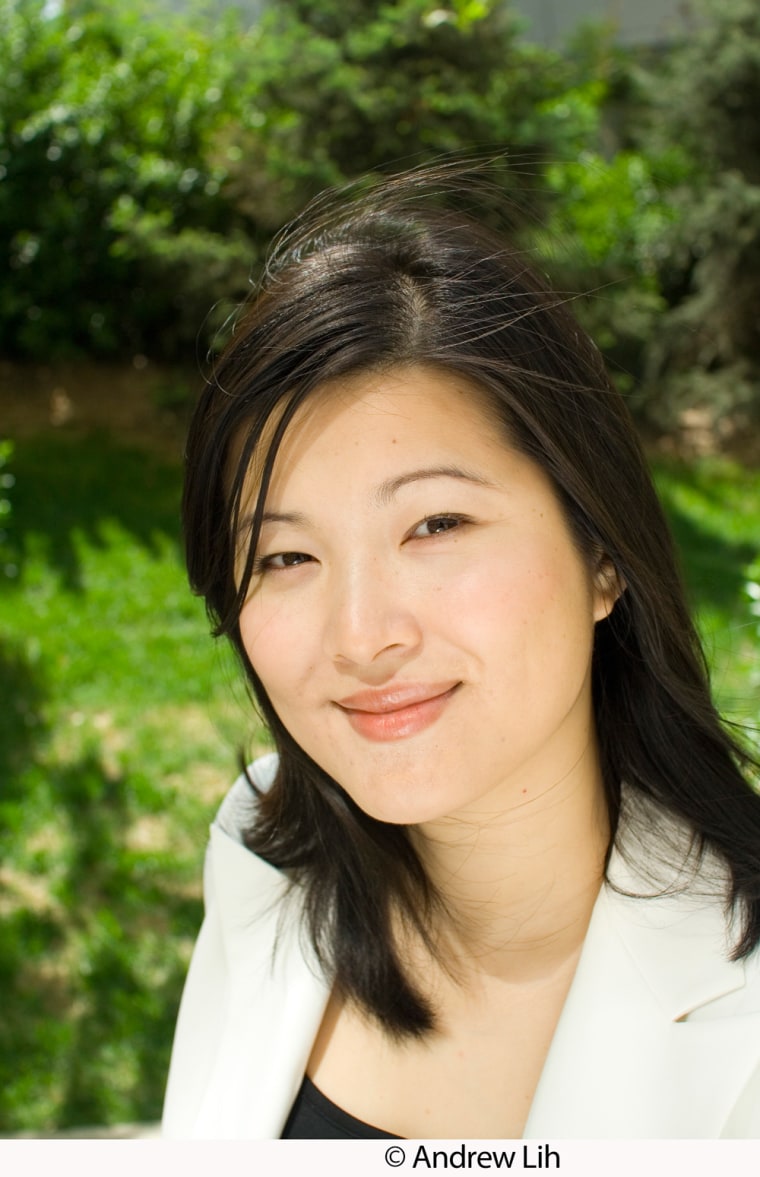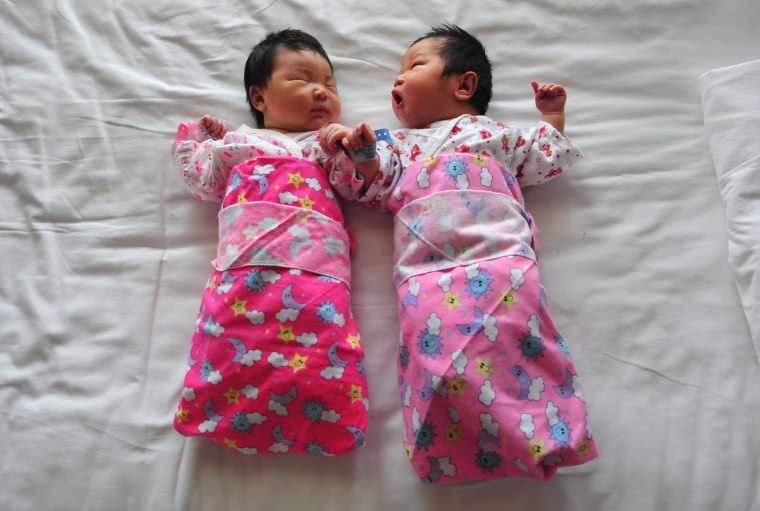At the end of October, the Chinese government ended its one-child policy, allowing married couples to have two children. More than three decades earlier, the Communist Party had unveiled the policy in order to control population growth. Harsh measures to limit family size—forced abortions, sterilization, and fines—have led to a population that is “too old, too male, and quite possibly, too few,” writes Pulitzer Prize-winning journalist Mei Fong in her new book "One Child: the Past and Future of China’s Most Radical Experiment."
Fong began reporting on China’s economic boom in 2003 for the Wall Street Journal. "One Child" illustrates the human costs of the one-child policy, and takes readers on a journey through China’s countryside and its cities to tell the story of how the plan affected the world's most populous country.
NBC News recently talked with Fong about her book, whose publication date was recently pushed up one month in light of the October news about the one-child policy.

What inspired you to write "One Child" and what do you hope to achieve?
Since the Chinese Communist Party announced the shift to a two-child policy, I’ve been getting some calls from media in China. The first question they always ask is, “How did [you] know this was going to happen?” since my book is coming out now. I was tempted to hint darkly of my sources in high places—as if!—but of course, many people who study this issue have been talking about how the one-child policy is on its last legs.
"China’s move to the two-child policy has been anticipated, but the exactitude of its timing was something nobody could really count on."
This sense of an ending is part of the reason why I wanted to write this book, to really evaluate the consequences of China’s longest-running social experiment. I’d seen books on various aspects of the policy: accounts of forced abortions, or academic studies of the one-child phenomenon, or gender imbalance, and plenty of stories from parents who’ve adopted China babies, but never something that tied it all together and tried to make sense of it all.
The one-child policy is still very misunderstood, both in China and outside China: from the name itself, to the patchwork way it is implemented, its aims, its goals. It would be unthinkable to imagine someone today saying something, like, “Well, slavery was evil, of course, but it did spur agricultural production,” or “Well, the two World Wars were dreadful, but they did reduce the carbon footprint.”
Yet there are still a lot of people who feel comfortable expressing the view that, despite all its excesses, the one-child policy was important, necessary, beneficial. I’d like my book to help us get to that point in history when such views are anathema, given all we know about the policy.
In the sum of things, the one-child policy wasn’t necessary—China already had in place a much less coercive and more successful population plan—it really had very little to do with China’s rapid-like economic growth, and it was extremely cruel to the country’s poorest and most defenseless people. Beyond that, the policy has far reaching implications for ordinary Chinese citizens, determining things like who they marry, what kind of jobs they may get, the homes they want to build for themselves, and if they will have a comfortable old age.
You’re of Chinese descent, raised in Malaysia, university educated in the United States, and you’ve worked in the U.S., Hong Kong, and China. How does your background contribute to your writing and reporting? Did it help you gain the trust of sources, and understand the language and culture, or did it pose a challenge?

I am third-generation Chinese, born in Malaysia from grandparents who emigrated from southern China. Growing up in Malaysia in the 1970s we were discouraged from learning Mandarin—this was still at a time when Southeast Asia feared the spread of Communism. So I learned Bahasa and English in school, and spoke Cantonese at home. When I dreamt of a career in foreign correspondence, I thought I would be posted to Indonesia because I speak fluent Bahasa. I only started to learn some rudimentary Mandarin in grad school. So I was hugely intimidated by the idea of covering China because of my so-so Mandarin. With a Chinese face, the bar is so much higher, and I couldn’t, as some of my Caucasian friends could, be praised for just uttering “ni hao.”
Also, the Wall Street Journal Beijing bureau was filled with a team of all-stars: people who were fluent, who’d studied Chinese history in the best schools, experienced reporters, beautiful writers. I felt extremely timid about getting up there with the heavy hitters. A colleague basically told me to get over it, saying, “Look, no matter how you try, there’s going to be a million people who’ll speak better Chinese than you. What are you going to do about it?”
So I got over it, and realized there was still plenty of scope for good stories. As my Mandarin got better, I was also able to take advantage of blending in with the local population. In a story about construction workers and their difficult lives, I was able to duck in and out of construction sites without attracting too much notice, similarly in a piece where I took a long journey with migrant workers back to the devastation of the 2008 Sichuan earthquake.
Later, as I wrote the book, I found things about my heritage useful in understanding the changes the one-child policy wrought on China’s family structure. My family clung to the old ways—one of them being a reverence for sons—and I am the youngest of five daughters, which is such a disastrous calamity for Chinese families. It is something that is hard to understand until you have lived it and see it—the pinches my grandmother would mete out to me and my sisters, compared to the caresses she lavished on my male cousins. My mother’s quiet sadness at family gatherings.

In the book, I recount how I visit my ancestral village in southern China, a small village dotted with fairy-tale towers that is now a UNESCO heritage site. The Fong family is extremely proud of their lineage—there’s even a Fong museum—and my grandfather was a rich man with a romantic streak who built a tower that he called the Tower of Illusory Cloud. It still stands. But the Rapunzels of this fairy-tale landscape are nameless and made little of. My father was 16th out of 18 sons—they didn’t count the daughters—and even in this seat of the Fong family, I couldn’t get a straight answer on how many aunts I had. It really shows the cultural bias for sons, which of course took an ugly turn with the one-child policy. People were more willing to have daughters provided they could also have sons. The policy forced all sorts of ugly, unpalatable choices.
In the course of your reporting in China, you suffered a miscarriage in the aftermath of the 2008 Sichuan earthquake. Eventually, you underwent IVF and gave birth to twins. How did these experiences shape your reporting and help you see families in a new way? How did having children help you relate to your sources, and for your sources to relate to you?
Chronicling my struggles with infertility in the land with the most rigid fertility controls gave my reporting fresh perspectives. I really went down the rabbit hole myself. By undergoing IVF in Beijing, I discovered how the one-child policy had distorted the way people used third-party reproductive technologies in China. Because multiples are exempt from the normal fines imposed on those who have more than one child, everyone wanted twins—buy one, get one free, is the thinking. Also, the one-child policy mandates that fertility services be available only to married couples, hence stifling regulatory oversight and creating grey areas for things like surrogacy and egg donation.
This has led to a rise in the number of wealthy Chinese coming to America in search of third-party reproductive techniques they can’t get back home. In the process, they are creating American babies. The China client base has specific demands because of a mindset shaped by the one-child policy. If you’ve been conditioned to choose, from the start, the number of children you can have, then the next steps enabled by technological advances are not so difficult to take: gender, then intelligence—there’s been a spike in demand for Asian egg donors in America, driven largely by China demand—and eventually, who knows? I think my unease reflects that of a majority who fear a sort of "Brave New World" scenario, but it is also tempered by my own experiences.
Beijing is on the road to ending the one-child policy amidst all these demographic pressures. They need more babies, but every indication suggests they won’t be able to turn on the baby tap with the same ease they turned it off. People all over China are making the same calculations I was making, and many are deciding that having one, or no children, is the best way forward. In many ways, "One Child" is a meditation on the costs of parenthood.
RELATED: The Real Reasons Behind China's New Child Policy
What are you working on now?
China’s move to the two-child policy has been anticipated, but the exactitude of its timing was something nobody could really count on. So when they made this announcement, my publishers moved up my book’s publication. There’s a whole host of plans that were disrupted because of this. The e-book is now out, and the hardback on Jan. 5, almost a full month ahead of schedule. In the language of parenthood, this baby’s a preemie. I find myself devoting a lot of time to making sure it gets off to a good start.
This interview has been edited for length and clarity.